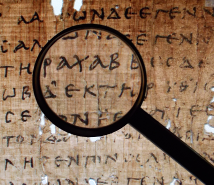
During the intertestamental history, the Greek language becomes a universal language. It is over simplistic to think this has everything to do with Alexander the Great. He is simply a corroborating factor to a spread of the Greek language that had already begun. If it is merely language by fiat as a result of imperialism, then Latin should have been the universal language at the time of Christ and the apostles since they were regime de jour. It is much more than who is the conquer at the time.
Trade
Before the acropolis is even built, there is trade. One thing that makes Greece a vital spot long before Philip and Alexander is the rich aquatic trade spots that pop up all over the Mediterranean coasts. Athens is by far the most successful in trade. Eventually, to do business in Athens, and for that matter laces like Corinth, Kos, or Naxos, you had to learn to speak the language of the traders. Second to the Greeks are the Phoenicians who lived north of Palestine. They are probably Greeks who settled there some time ago. They were excellent ship builders. This is their advantage. Greece simply had the goods people wanted. In this, it may be said that Phoenicians are not so much second to the Greeks but collaborators with the Greeks.
If you wish to trade with the Greeks, you speak Greek. And if you wish to trade with those carrying Greek goods, you speak Greek. So absolute is this concept that the Greeks had a term for civilizations that did not speak Greek. They are the barbarians. It’s quite a derogatory term that come from all they say sounds like bar, bar, bar. The barbarians were inland Europeans with little or no Mediterranean coastline, most of whom were Germanic tribes. Greek was the language of money, so it became the language of the world and it stayed that way. Rome is certainly interested in trade, but more from the importing than exporting side. And by the time they become important, Greek is on its way as the common language.
Culture
Now Alexander comes in and seals the deal. He conquers the world to Hellenize it, or in other words, to make it more Greek. By this, he can show the world how vastly superior Greek culture is and share it with everybody. Language is but one part of this, but it is an indispensable part. Instead of forcing Greek living on everyone at the point of the sword (like some of his successors would try), Alexander tries to make the Greek culture seem appealing, first to the influential in society in other places.
One of Alexander’s tasks is to create new cities throughout his empire that exist solely to demonstrate the superior Greek culture in these newly conquered places. The most notable of these cities is Alexandria. Alexander really took to Egypt when he was down there and they took to him. He thought the Egyptians were the most advanced or any society outside of Greece, even more than the Persians and Babylonians. So in addition to the trade, Greek is now the language of the highly cultured, and in time, all of government.
Instruction
This helps in the spread of New Testament Christianity. First of all, the Hebrew Old Testament is translated into Greek beginning in 250 BC. This translation is called the Septuagint. The apostle Paul can travel the world go into one synagogue after another and preach Jesus from the prophesies and in a language they would know and from a text they can read for themselves. It also gives the first century evangelists a universal language they can preach in wherever they go. Of course, the is the first century miracle of speaking in tongues, which is speaking in a human language not previously studied by the speaker, but still a person preach who does not have this miracle.
Most importantly, the New Testament is written Greek. More to the point, it’s written in koine Greek. This means it is written in a dead language. In between ancient Greek of Homan and modern Greek for today there is koine Greek. It is no longer written and isn’t studied by Greek. It’s studied, but only by preaching students. It is considered a dead language, which means it is not subject to change and variation like practicing languages are. Just think about how English has changed in your own lifetime. Old English simply unreadable. Even though Greek has changed over its three periods, it has stayed remarkably the same. Over 70% of ancient can be read my those who know modern Greek, and 90% of koine can be read by modern Greeks. As it is a dead language, each koine Greek word is fixe and its meaning is absolute. An evolving and changing language could not offer this certainty. Surely the wisdom of God is seen in His providence by providing a perfect language for revealing and spreading His word.

Pingback: History Between The Testaments: Part Five – The Rise Of Herod & Pilate | This Is My Father's World
Pingback: History Between The Testaments: Part Six – The Search For Peace | This Is My Father's World
Pingback: History Between The Testaments: Part Eight – Caesar Worship | This Is My Father's World
Pingback: History Between The Testaments: Part Nine – The Development of the Pharisees & the Sadducees | This Is My Father's World
Pingback: History Between The Testaments: Part Ten – The Sanhedrin & The Synagogues | This Is My Father's World
Pingback: History Between The Testaments: Part Twelve – Roman Slavery | This Is My Father's World